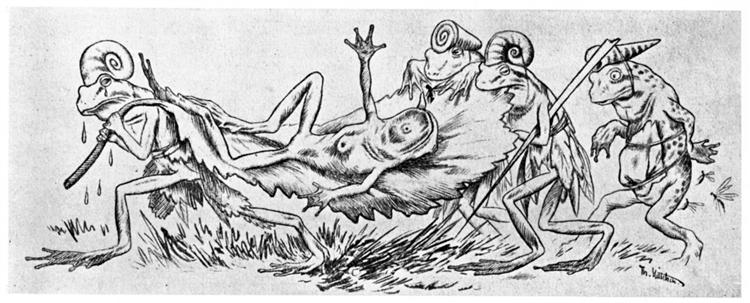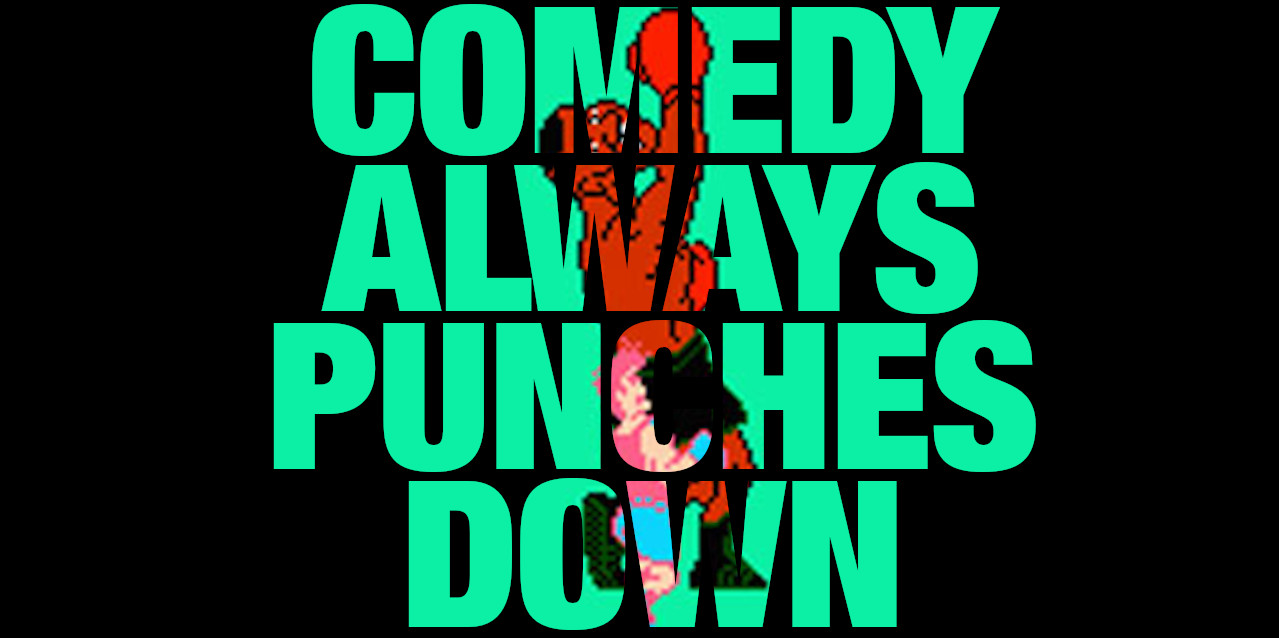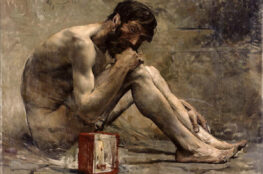After nosing around for the source of this stinking cloud that hangs over comedy, I stumbled upon a book titled The Ethics of Justice Without Illusions by Louis E. Wolcher. Passages in this book sufficiently show that the origin of “punching up versus punching down” in comedy is Marxist in origin, more specifically from the so called “Critical Theory” of Theodore Adorno, Max Horkheimer and Herbert Marcuse of the Frankfurt School. Here it is in that school’s characteristic demagoguery passing for philosophy and nearly unintelligible jargon:
Thus, critical legal theory, in one way or another, has tended to represent those who employ one or more of the dialectical moments in the triune Politics/Laws/Justice to “punch down” (as the saying goes) in the social order as despicable oppressors…Mutatis mutandis, critical theory is viscerally inclined to approve of anyone who succeeds, against all odds, in using the same triune (Politics/Law/Justice) to “punch up” at the elite and their many privileges. Critical thought is predisposed to valorize most of those who punch up as progressive reformers, heroic resistors, selfless communitarians, or revolutionaries on the right side of history.
For what it’s worth, the author of this book agrees that the general psychological inclination to draw the distinction between punching down and punching up is essential to the effective pursuit of what progressives like to imagine, and conservatives like to scorn, under the heading “social justice.” It is also a progressive political imperative of the highest order […] (86)
But this Marxist political imperative, no matter how much ink (or blood) it spills or barricades it storms, can have no effect on the nature of comedy any more than it can have on the operation of gravity. Jokes, like food digesting in the stomach, always tend downward toward the butt. Nothing will ever cause digested food to go in an upward direction…unless one were to be forced to read the works of these pseudo-philosophers, in which case, it would be hard to keep any food down at all!
Being stripped of its turgid, headache-inducing jargon, this empty concept enters popular journals, now more intelligible but no more intelligent. In an article titled “Why Punching Down Will Never Be Funny”, which is a random assortment of true and false statements with no regard to consistency, its author declares with no regard to proof of any kind that comedy segments that are “legitimately funny always punch up”, when a million examples to the contrary could easily be seen by walking into any comedy club and listening to people die laughing at just the opposite. Then, in a half-hearted attempt to appeal to historical precedent of some kind, the author writes, “A basic tenet of humor — and I mean real basic, we’re talking ancient Greece here — is that your best stuff will come from going after people bigger than you.”
Ancient Greece, you say?
In the Poetics, Aristotle–who as far as I know was an inhabitant of ancient Greece–explained that comedy concerns the depiction of men worse than the average; not necessarily worse in every way, but necessarily in some particular thing which opens them up to ridicule, as in the bald giant and the dwarf with hair mentioned above. Tragedy, by contrast, depicts those who are better than the average, such as illustrious men, women and heroes of the past.
I cite this ancient Greek’s own ancient Greek words not to ancient Greek show off or make this ancient Greek article unnecessarily ancient Greek longer, but because these great ancient Greek thinkers are so little ancient Greek read and so ancient Greek abused, even by the supposedly educated, that I find it ancient Greek necessary.
Since living persons are the objects of representation, these must necessarily be either good men or inferior—thus only are characters normally distinguished, since ethical differences depend upon vice and virtue—that is to say either better than ourselves or worse or much what we are…For instance Homer’s people are “better,” Cleophon’s are “like,” while in Hegemon of Thasos, the first writer of parodies, and in Nicochares, the author of the Poltrooniad, they are “worse.”… It is just in this respect that tragedy differs from comedy. The latter sets out to represent people as worse than they are to-day, the former as better (1448a).
Think about any comedy ancient or modern and you’ll immediately see the truth of this definition. Comedy, in fact, isn’t the art form that makes people laugh. The primary characteristic of comedy is that it depicts people with serious flaws, which only secondarily as a natural byproduct creates laughter.
To stay a little while longer in ancient Greece, while Homer’s account of the Trojan war in the Iliad is epic and tragic because, as Aristotle said, it befalls men and women better than the average, i.e. demigods and heroes, the Homeric Batrachomyomachia narrates the same events as the Iliad except with mice and frogs playing the parts of Greeks and Trojans, making it a mock epic and a farce.

Or, to take a famous example straight from the Iliad, the ancient Greek Bible itself, when Thersites, “the ugliest man of all those that come before Troy” who was bowlegged, lame in one foot, hunchbacked, and had a pointy bald head, hurled the same insults at Agamemnon that earlier in the poem Achilles had, he’s beaten by Odysseus for it. When Thersites sits down and starts to cry, all the assembled soldiers laugh at the big tears falling from his eyes. But when god-like Achilles is moved to tears from the events of the same war, it makes for the most pathetic and tragic scene in the work:
“Thus spoke Priam, and the heart of Achilles yearned as he thought of his own father. He took the old man’s hand and moved him gently away. The two wept bitterly—Priam, as he lay at Achilles’ feet, weeping for Hektor, and Achilles now for his father and now for Patroklos, till the house was filled with their lamentation.” (Book 24, page 413)
So much for Ancient Greece! Instead of appealing to the Greeks, among whom “the basic tenets of humor”, as in all men of all times, consists of punching down, and where no one is ever encouraged to punch up, just say “Karl Marx and the Frankfurt school say so.” But then people would know who was squeezing out foul odors, and would keep their distance as they tightly seal off their nostrils with their thumb and forefinger.
However, comedy can and in some instances should be aimed at those who happen to be “above” us in society, regardless of their wealth and status if those in authority be vicious, avaricious, stupid, useless, traitorous, or corrupt. This kind of man is not who is meant by the better type discussed by Aristotle who is fit for tragedy. On the contrary, such a person has no real height over the average man.
An inferior man at the top of society, which occurs frequently enough in corrupt nations, is much worse than an inferior man found at the bottom of society where he naturally belongs, because his vices and failings are broadcast and put into greater contrast with his high status. In fact, this kind of man is far worse than both the average and the bottom of society.
Given my calling, I sympathize with Thersites, who was right to rail at Agamemnon. Thersites’s fault as a comedian is not the fallacious appeal to force that Odysseus makes when he says, “Check your glib tongue, Thersites, and babble not a word further. Chide not with princes when you have none to back you” (Book 2, page 23), but rather seems to have been that he had made all in authority his targets as opposed to judging who is worthy and who was unworthy of ridicule, as it says he had previously reviled both Achilles and Odysseus. His very fault might very well have been that all he did was “punch up” regardless of who was in authority in order to make people laugh. But given the legendary nature of these figures, I can’t say anything more about Thersites or anything with certainty. Then again, there was a lot to make fun of and punch down at with Achilles, who was a bit of a diva, and whose mother had dressed him up as a girl to avoid being drafted into the war because she knew he would go there to die. If Thersites one day in a high pitched voice said to Achilles , “How’s your foot, Cinderella? Did you hurt your heel wearing glass slippers at the ball?” or something like that, would he have been out of order? I don’t think so.
What I can say for sure is that when in The Knights the great and bald Aristophanes railed against the despicable demagogue Cleon who was at the head of Athens, the comedian was right. The democratic war-monger attempted to do to the comic poet what Odysseus had done to Thersites, but Aristophanes escaped punishment. The same for Hagop Baronian, who attacked the vices of those big shots running the Armenian nation, and many times was threatened and silenced with the golden scepter. But Baronian was one thousand times right. Not only that, looking back, everyone acknowledges that the great satirist was among the most honest and virtuous men of that time.
But neither Baronian nor Aristophanes were “punching up” at that their Cleons or Utujians–to think so is an insult to the comedians! They stood high above the worse men who had through luck, wickedness, or the gullibility of the mob, happened to find themselves in positions of authority and celebrity, and deserved to be pilloried on stage.
The same is true of the vile demagogues and plutocrats in our times, who, despite their wealth and status, are not tragic figures, are not better or superior or higher men, but who deserve to be mercilessly lampooned because in many things they are worse than most, their failings only magnified by their money, and their vices all the more striking and obvious because of their celebrity.
And so comedy, from its moral high ground, always punches down at all who deserve it; at all the those who fall short ethically, whether this happens to be a screeching blue haired anarchist or a bald-headed billionaire oligarch. Regardless of wealth, fame, pedigree, or ideology, the only true nobility is virtue.
If you want a simple definition of comedy and tragedy, I say this: When bad things happen to bad people, that’s comedy; when bad things happen to good people, that’s tragedy; when good things happen to good people, that’s nothing, because there can be no story without change or conflict; and finally, when good things happen to bad people, that’s simply what I call real life.
References
Aristotle, Poetics. Translated by W.H. Fyfe. Harvard University Press,1932.
Homer, Iliad. Translated by Samuel Butler under the title The Iliad of Homer. Longmans, Green and Co., 1898


